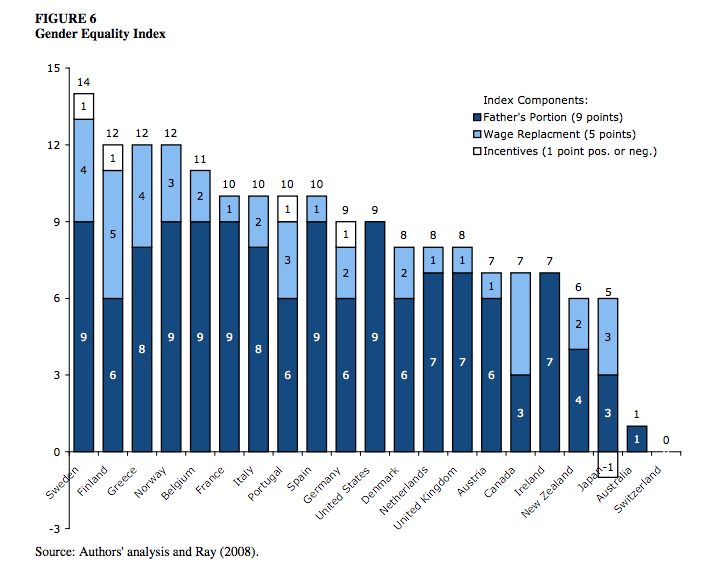One Thing We Need to Give Men to Ensure Gender Equality

By:
American Express just took a big step towards gender equality. Starting in January, both male and female employees will be given 20 weeks of paid parental leave, the company announced Monday.
 Flickr/Japanexperterna.se - flic.kr
Flickr/Japanexperterna.se - flic.kr
The credit card company currently offers six weeks of paid parental leave to the primary parent and an additional six to eight weeks of medical leaves for birth mothers.
Over at Science of Us, reporter Drake Baer argues that the expanded leave for men is actually a major step for women, too.
Baer explains why:
"Take note: If there is going to be gender equality at some beautiful point in the egalitarian future, then paternity leave is going to have to be as prevalent and requisite as maternity leave.
"This is because, as one shocking organizational psychology study found this month, elite firms are less likely to be interested in hiring women because the dudes sorting through résumés think that women are less likely to be committed to the job."
In short, the presumption that women should be responsible for the brunt of childcare makes them a less attractive option to managers. So, policy that encourages men to play a more active role in the home could eventually lead to more opportunity for women in the workplace.
The data backs this up.
"The State of the World's Fathers" report (PDF), presented to the United Nations in June 2015, argues countries must provide paternity leave in order to achieve gender equality. Paternity leave also benefits the economy, the report asserts. Emphasis mine:
"Men’s greater involvement in care work also brings economic benefits. If women participated in the labor market at the same rates as men do, it is estimated that the gross domestic product (GDP) could increase in the United States by five percent, in Japan by nine percent, in the United Arab Emirates by 12 percent, and in Egypt by 34 percent. There is increasing evidence that providing paid family leave is good for business: it improves employee retention and reduces turnover, it increases productivity and morale, and it reduces absenteeism and training costs. At the household level, leave for fathers supports women’s participation in the labor market and can increase their income and career outcomes. A study from Sweden showed that every month that fathers took paternity leave increased the mother’s income by 6.7 percent, as measured four years later, which was more than she lost by taking parental leave herself."
 Stocksy/Vera Lair - stocksy.com
Stocksy/Vera Lair - stocksy.com
A 2008 report (PDF) from the Center for Economic and Policy Research scored 21 countries' parental leave policies on a 15-point scale measuring gender equality.
Japan received one of the three lowest scores. "In Japan, one parent must take all of the family’s parental leave, which has the effect of dramatically reducing fathers' incentive to take leave," the authors write.
 Center for Economic and Policy Research - lisdatacenter.org
Center for Economic and Policy Research - lisdatacenter.org
What are the consequences of bad parental leave policies?
On Business Insider, Richard Jackson, the president of nonprofit research group the Global Aging Institute, links low birth rates in South Korea and Japan to leave policies that discourage women from working and starting families.
So, what's the solution?
Baer suggests that making paternity leave mandatory, as Sweden has done — would eliminate employers' biases that female job applicants will be less committed.
The Swedish government requires fathers to take three months of paid leave, CNN reports. Sweden also received the highest score on the Center for Economic and Policy report.
You can read the original report on Science of Us.
